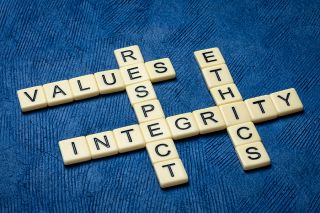Career
Be Guided in Life and at Work by These 5 Values
Today's knowledge workers can learn from Peter Drucker's bedrock principles.
Posted October 14, 2023 Reviewed by Hara Estroff Marano
Key points
- Generosity and lifelong learning are two of five bedrock values Peter Drucker advocated.
- Effectiveness is an umbrella term including workmanship, diligence, and conscientiousness.
- Your personal values should match those of the organization you work for.

In his life and his work, throughout his 70-plus years as a writer, consultant, and professor, Peter Drucker exemplified five bedrock values.
Applying those values, today's knowledge workers can find increased meaning and impact. The values provide guidance for life in general but especially for navigating today’s uncertain, ever-changing work world, whether or not you are a manager or a leader. Their application can lead you to focus on positive results beyond personal benefits, with effects that impact your organization, its stakeholders, and possibly society as a whole.
Emulating Drucker's approach to life and work is a worthy goal, open to all. Let’s review the values, how they played out in Drucker’s life, and their meaning for today's knowledge workers and their organizations:
Integrity includes the whole notion of having personal values in the first place. Identify what those values are; how to cultivate them, and how they relate to your work. Integrity and strength of character engender trust, and trust underpins all relationships, inside and outside the workplace. This requires self-knowledge as well as self-management. In 1952, half a decade before Drucker identified the concept of knowledge workers, he wrote: “But fundamentally the one quality demanded of you will not be skill, knowledge, or talent, but character.”
Effectiveness is the theme of one of Drucker’s most important books, The Effective Executive (1967). Within that umbrella term I include workmanship, diligence, being conscientious, and continually building a robust body of work, in a variety of formats. Another component is multidimensionality, or what Drucker described in one of our interviews as '"living in more than one world."
Generosity is displayed by helping and collaborating with others; giving back by teaching and mentoring; as well as pro bono work and volunteering. Drucker stayed in touch with many former students throughout his life, and tried to help boost their careers. He also had many pro bono consulting clients, including nonprofit organizations such as Girl Scouts of the USA and the Salvation Army.
Lifelong learning can be expressed by either formal learning or self-study. Drucker engaged in the latter activity for most of his life, picking a subject and studying it intensively for years or months at a time. One of his final self-study projects was rereading all of Shakespeare’s plays. With all of today’s online learning outlets, including apps, ebooks, and the opportunity to pursue additional educational degrees or certificates online, lifelong learning is more available than at any time in history.
Communication involves a fundamental question: How do you communicate to the outside world about your work and your professional/personal identity? What do you stand for as a person and a professional, and how can people learn about it? Drucker believed that it required using clear and concise language in conveying your message, in both writing and speaking. Communication emphasizes reaching the outside world beyond your own four walls and also involves the art of listening.
Organizations: Ever-Shifting Collections of People
Today’s abundance of communication channels, especially social media, email, and other online communication systems, makes it especially crucial to be clear about what you stand for and how those messages are received.
The five bedrock Drucker values also pertain to organizations, which, after all, are collections of people; in many cases, ever-shifting collections. We want our organizations, those we are affected by and those we work with and for, to act with integrity and in a spirit of generosity, to do their work effectively, to provide lifelong learning opportunities, and to communicate their messages, including what they stand for.
People should match their values to those of the organizations they work for. "The unhappy people I’ve known,” Drucker told me in a 2005 interview, “are the ones who can’t resist what looks like a big chance, a big promotion, a big success, that is not for them. Skills one can acquire, values no. And the people I’ve seen who are really unhappy are in a position where the values of the organization don’t fit them.”
The Combination of Values
While each value is important on its own right, they can be especially powerful in the aggregate. They may also lead you to think deeply about your own values, how they might differ (in terminology or otherwise), and the meaning they hold for you.
References
Peter F. Drucker (with Joseph A. Maciariello) The Daily Drucker: 366 Days of Insight and Motivation for Getting the Right Things Done (HarperBusiness, 2004)
Peter F. Drucker: The Effective Executive: The Definitive Guide to Getting the Right Things Done, 50th anniversary edition (Harper Business, 2017)
Bruce Rosenstein: Create Your Future the Peter Drucker Way: Developing and Applying a Forward Focused Mindset (McGraw-Hill Education, 2013)
Bruce Rosenstein: Living in More Than One World: How Peter Drucker's Wisdom Can Inspire and Transform Your Life (Berrett-Koehler, 2009)


